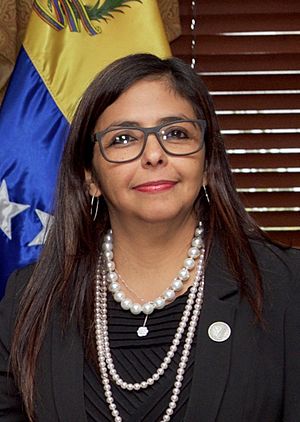Vice President of Venezuela facts for kids
Quick facts for kids Vice President of the Bolivarian Republic of Venezuela |
|
|---|---|

Flag of Venezuela
|
|

Logo of the Vice President of Venezuela
|
|
| Residence | La Viñeta |
| Term length | No fixed term At the President's pleasure |
| Inaugural holder | Diego Bautista Urbaneja |
| Formation | 1830 |
| Website | Vicepresidencia de la República |
The Vice President of Venezuela is a very important job in the government of Venezuela. Their official title is the Executive Vice President of the Bolivarian Republic of Venezuela. This person is the second most powerful leader in the country. They work closely with the President of Venezuela, following the rules set in the Constitution.
The role of Vice President first appeared in Venezuela's Constitution in 1830. It was removed in 1858 but brought back in the 1999 Constitution. Today, the Vice President's job is a lot like a prime minister in other countries, such as France or South Korea.
Since June 14, 2018, Delcy Rodríguez has been the Vice President. She is a member of the United Socialist Party of Venezuela and works with President Nicolás Maduro.
Contents
What the Vice President Does
Main Responsibilities
The Constitution of 1999 explains the many important tasks of the Executive Vice President. They are like the President's main helper.
- They work with the President to guide the government's actions.
- They help manage the country's public services and administration. This is done following the President's directions.
- They suggest new ministers to the President and also suggest when ministers should be removed.
- They can lead Cabinet meetings if the President is away or gives them permission.
- They help manage the relationship between the government and the National Assembly.
- They lead the Federal Council of Government, which helps coordinate different parts of the government.
- They can hire and fire government officials, unless another authority is in charge.
- They can take over as President if the President is temporarily or permanently unable to do their job. This is explained in Articles 233 and 234 of the Constitution.
- They also carry out any other duties the President asks them to do.
How a Vice President is Chosen and Removed
The President of Venezuela chooses and can remove the Executive Vice President. However, the Vice President can also be removed by the National Assembly. This requires more than two-thirds of the votes from the Assembly members. If the National Assembly removes three Vice Presidents during one six-year presidential term, the President has the power to dissolve, or close down, the Parliament.
Taking Over as President
The Executive Vice President is the first person in line to become President if the current President cannot continue their duties. This happens in special situations mentioned in the Constitution.
Some former Vice Presidents have even served as acting Presidents of Venezuela. These include Andrés Navarte, Carlos Soublette, Diosdado Cabello (in April 2002), and Nicolás Maduro (from 2012 to 2013). Both Soublette and Maduro were later elected as President.
Past Vice Presidents of Venezuela
State of Venezuela (1830–1864)
| Portrait | Name (Born–Died) |
Time in Office — Political Party |
Notes | President | ||||||||||||||||||||||||||
|---|---|---|---|---|---|---|---|---|---|---|---|---|---|---|---|---|---|---|---|---|---|---|---|---|---|---|---|---|---|---|
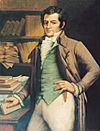 |
Diego Bautista Urbaneja (1782–1856) |
1830 | 1833 | Interim |  José Antonio Páez (1830–1835) |
|||||||||||||||||||||||||
| Conservative Party | ||||||||||||||||||||||||||||||
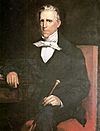 |
Andrés Narvarte (1781–1853) |
1830 | 1835 | Indirect elections | ||||||||||||||||||||||||||
| Conservative Party |  José María Vargas (1835) |
|||||||||||||||||||||||||||||
| No Vice President under José María Carreño (1835) | ||||||||||||||||||||||||||||||
 |
Andrés Narvarte (1781–1853) |
1835 | 1836 | Indirect elections |  José María Vargas (1835–1836) |
|||||||||||||||||||||||||
| Conservative Party | ||||||||||||||||||||||||||||||
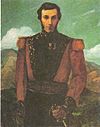 |
José María Carreño (1792–1849) |
1836 | 1837 | Indirect elections |  Andrés Narvarte (1836–1837) |
|||||||||||||||||||||||||
| Conservative Party | ||||||||||||||||||||||||||||||
 |
Diego Bautista Urbaneja (1782–1856) |
1837 | Indirect elections |  José María Carreño (1837) |
||||||||||||||||||||||||||
| Conservative Party | ||||||||||||||||||||||||||||||
| No Vice President under Carlos Soublette (1837–1839) | ||||||||||||||||||||||||||||||
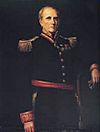 |
Carlos Soublette (1789–1870) |
1839 | 1841 | Indirect elections |  José Antonio Páez (1839–1843) |
|||||||||||||||||||||||||
| Conservative Party | ||||||||||||||||||||||||||||||
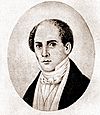 |
Santos Michelena (1797–1848) |
1841 | 1845 | Indirect elections | ||||||||||||||||||||||||||
| Conservative Party |  Carlos Soublette (1843–1847) |
|||||||||||||||||||||||||||||
 |
Diego Bautista Urbaneja (1782–1856) |
1845 | 1847 | Indirect elections | ||||||||||||||||||||||||||
| Conservative Party |  José Tadeo Monagas (1847–1851) |
|||||||||||||||||||||||||||||
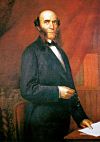 |
Antonio Leocadio Guzmán (1801–1884) |
1847 | 1851 | Indirect elections | ||||||||||||||||||||||||||
| Liberal Party |  José Gregorio Monagas (1851–1855) |
|||||||||||||||||||||||||||||
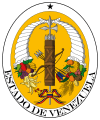 |
Joaquín Herrera (1784–1868) |
1851 | 1855 | Interim | ||||||||||||||||||||||||||
| Liberal Party | ||||||||||||||||||||||||||||||
| No Vice President under José Tadeo Monagas (1855–1858) | ||||||||||||||||||||||||||||||
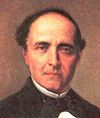 |
Manuel Felipe de Tovar (1803–1866) |
1858 | 1859 | Interim |  Julián Castro (1858–1859) |
|||||||||||||||||||||||||
| Liberal Party |  Pedro Gual (1859) |
|||||||||||||||||||||||||||||
| No Vice President under Manuel Felipe de Tovar (1859–1860) | ||||||||||||||||||||||||||||||
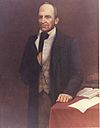 |
Pedro Gual Escandón (1783–1862) |
1860 | 1861 | Interim |  Manuel de Tovar (1859–1861) |
|||||||||||||||||||||||||
| Liberal Party | ||||||||||||||||||||||||||||||
| No Vice President under Pedro Gual Escandón (1861) | ||||||||||||||||||||||||||||||
| No Vice President under José Antonio Páez (1861–1863) | ||||||||||||||||||||||||||||||
 |
Antonio Leocadio Guzmán (1801–1884) |
1863 | 1868 | Indirect elections |  Juan Crisóstomo Falcón (1863—1868) |
|||||||||||||||||||||||||
| Liberal Party | ||||||||||||||||||||||||||||||
United States of Venezuela (1901–1928)
| Portrait | Name (Born–Died) |
Time in Office — |
Notes | President | ||||||||||||||||||||||||||
|---|---|---|---|---|---|---|---|---|---|---|---|---|---|---|---|---|---|---|---|---|---|---|---|---|---|---|---|---|---|---|
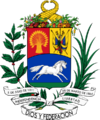 |
Jesús Ramón Ayala (?–?) |
March 1901 | April 1904 | First Vice President | Cipriano Castro | |||||||||||||||||||||||||
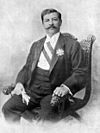 |
Juan Vicente Gómez (1857–1935) |
March 1901 | April 1904 | Second Vice President | Cipriano Castro | |||||||||||||||||||||||||
 |
Juan Vicente Gómez (1857–1935) |
April 1904 | 1908 | First Vice President | Cipriano Castro | |||||||||||||||||||||||||
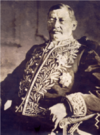 |
José Antonio Velutini (1844–1912) |
April 1904 | 1908 | Second Vice President | Cipriano Castro | |||||||||||||||||||||||||
 |
Juan Pietri Pietri (1849–1911) |
Apr 1910 | 28 May 1911 | Juan Vicente Gómez | ||||||||||||||||||||||||||
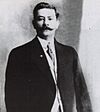 |
Juan Crisóstomo Gómez (1860–1923) |
June 1922 | 30 June 1923 | First Vice President | Juan Vicente Gómez | |||||||||||||||||||||||||
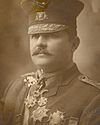 |
José Vicente Gómez Bello (1884–1930) |
June 1922 | May 1928 | Second Vice President | Juan Vicente Gómez | |||||||||||||||||||||||||
Fifth Republic (1999–Present)
| Portrait | Name (Born–Died) |
Time in Office — Political Party |
Notes | President | ||||||||||||||||||||||||||
|---|---|---|---|---|---|---|---|---|---|---|---|---|---|---|---|---|---|---|---|---|---|---|---|---|---|---|---|---|---|---|
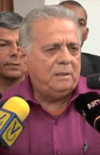 |
Isaías Rodríguez (1942–2025) |
29 January 2000 | 24 December 2000 | Directly chosen |  Hugo Chávez (1999–2002) |
|||||||||||||||||||||||||
| Fifth Republic Movement | ||||||||||||||||||||||||||||||
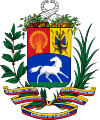 |
Adina Bastidas (born 1943) |
24 December 2000 | 13 January 2002 | Directly chosen | ||||||||||||||||||||||||||
| Independent | ||||||||||||||||||||||||||||||
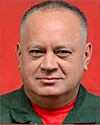 |
Diosdado Cabello (born 1963) |
13 January 2002 | 12 April 2002 | Directly chosen | ||||||||||||||||||||||||||
| Fifth Republic Movement | ||||||||||||||||||||||||||||||
| No Vice President under Pedro Carmona (2002) | ||||||||||||||||||||||||||||||
| No Vice President under Diosdado Cabello (2002) | ||||||||||||||||||||||||||||||
 |
Diosdado Cabello (born 1963) |
14 April 2002 | 28 April 2002 | Directly chosen |  Hugo Chávez (2002–2013) |
|||||||||||||||||||||||||
| Fifth Republic Movement | ||||||||||||||||||||||||||||||
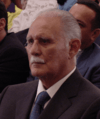 |
José Vicente Rangel (1929–2020) |
28 April 2002 | 3 January 2007 | Directly chosen | ||||||||||||||||||||||||||
| Fifth Republic Movement | ||||||||||||||||||||||||||||||
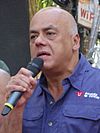 |
Jorge Rodríguez (born 1965) |
3 January 2007 | 4 January 2008 | Directly chosen | ||||||||||||||||||||||||||
| Fifth Republic Movement | ||||||||||||||||||||||||||||||
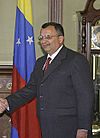 |
Ramón Carrizales (born 1952) |
4 January 2008 | 26 January 2010 | Directly chosen | ||||||||||||||||||||||||||
| Fifth Republic Movement United Socialist Party |
||||||||||||||||||||||||||||||
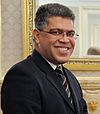 |
Elías Jaua (born 1969) |
26 January 2010 | 13 October 2012 | Directly chosen | ||||||||||||||||||||||||||
| United Socialist Party | ||||||||||||||||||||||||||||||
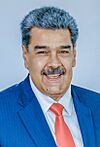 |
Nicolás Maduro (born 1962) |
13 October 2012 | 8 March 2013 | Directly chosen | ||||||||||||||||||||||||||
| United Socialist Party | ||||||||||||||||||||||||||||||
 |
Jorge Arreaza (born 1973) |
8 March 2013 | 6 January 2016 | Directly chosen |  Nicolás Maduro (2013–) |
|||||||||||||||||||||||||
| United Socialist Party | ||||||||||||||||||||||||||||||
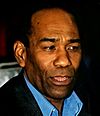 |
Aristóbulo Istúriz (1946–2021) |
6 January 2016 | 4 January 2017 | Directly chosen | ||||||||||||||||||||||||||
| United Socialist Party | ||||||||||||||||||||||||||||||
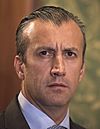 |
Tareck El Aissami (born 1974) |
4 January 2017 | 14 June 2018 | Directly chosen | ||||||||||||||||||||||||||
| United Socialist Party | ||||||||||||||||||||||||||||||
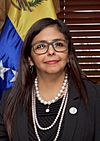 |
Delcy Rodríguez (born 1969) |
14 June 2018 | 10 Jan 2025 | Directly chosen | ||||||||||||||||||||||||||
| United Socialist Party | ||||||||||||||||||||||||||||||
 |
Delcy Rodríguez (born 1969) |
10 Jan 2025 | incumbent | Directly chosen | ||||||||||||||||||||||||||
| United Socialist Party | ||||||||||||||||||||||||||||||
See also
 In Spanish: Vicepresidente de Venezuela para niños
In Spanish: Vicepresidente de Venezuela para niños
- List of presidents of Venezuela
- List of current vice presidents
 | Laphonza Butler |
 | Daisy Bates |
 | Elizabeth Piper Ensley |


